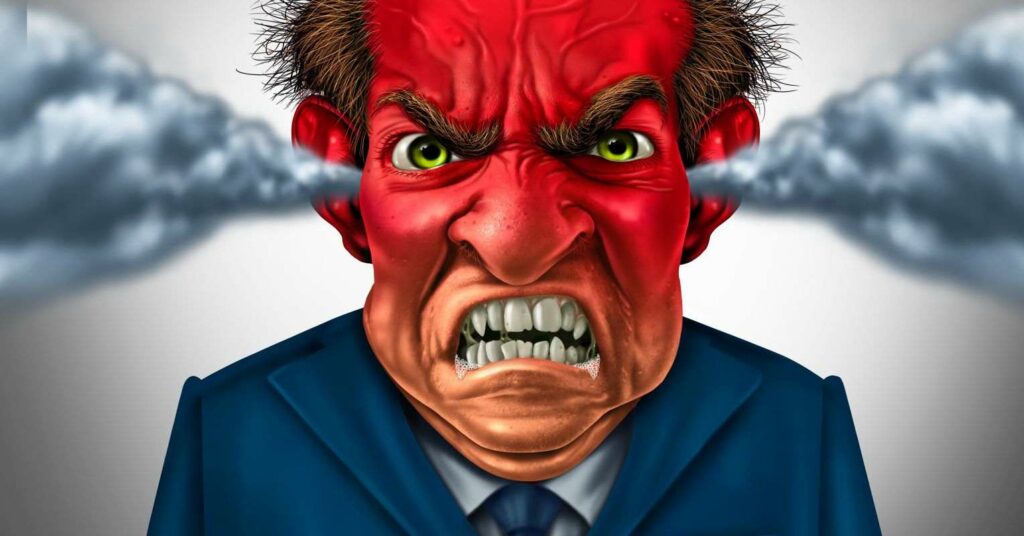Do you ever feel like you’re about to lose control? That your temper is just one step away from exploding? If so, you may be experiencing anger attacks. Anger attacks can be very frightening and overwhelming, but with the right information and support, they can be managed. In this blog post, we will discuss what anger attacks are, how to recognize them, and how to deal with them.
Contents
What Are Anger Attacks?
Anger attacks refer to a sudden, intense feeling of anger. This can manifest as physical aggression, verbal outbursts, or destructive behavior. Anger attacks are often unprovoked and can be difficult to control.
Moreover, these attacks can be dangerous as they can lead to accidents or violence. There have been studies that show a correlation between anger attacks and heart disease. Because of this, it is important to learn how to recognize and deal with them.
In addition, anger attacks can be a symptom of other underlying mental health conditions, such as anxiety or depression. If you are experiencing regular anger attacks, it is important to speak to a mental health professional.
What Are the Signs of Anger Attacks?
There are several physical and behavioral signs that may indicate that someone is having an anger attack. These can include:
- Clenching their fists or teeth
- Screaming or shouting
- Pounding on object
- Breaking things
- Becoming physically aggressive, such as pushing or hitting someone
- Expressing their anger in a verbally abusive way, such as name-calling or insults
- Threatening violence
- Seeming out of control
If you notice someone exhibiting these signs, it’s important to try to stay calm and avoid getting angry yourself. This can be difficult, but remember that the person is likely not in control of their emotions. And may not be able to help themselves.
Anger attacks are often the result of built-up anger that has been simmering for some time. If you find yourself in this situation, it’s important to take a step back and try to understand what is causing your anger. Otherwise, things can quickly spiral out of control.
What Causes Anger Attacks?
The causes of anger attacks can vary from person to person. Some common triggers include:
Overwhelmed
When you are feeling overwhelmed or stressed, your body’s natural reaction is to release adrenaline. This can cause you to feel jittery, anxious, and irritable. If you’re already dealing with anger issues, this can trigger an anger attack. In fact, during anger attacks, your heart rate, and blood pressure increase, just as they would during a stress response.
Other mental illnesses
 If you suffer from anxiety or depression, you may be more prone to anger attacks. This is because these conditions can cause changes in your brain chemistry that make it difficult to regulate your emotions. Additionally, people who are struggling with mental health issues may be more likely to self-medicate with drugs or alcohol, which can also contribute to anger attacks.
If you suffer from anxiety or depression, you may be more prone to anger attacks. This is because these conditions can cause changes in your brain chemistry that make it difficult to regulate your emotions. Additionally, people who are struggling with mental health issues may be more likely to self-medicate with drugs or alcohol, which can also contribute to anger attacks.
Sleep Deprivation
When you’re tired, it’s harder to control your emotions. You may find yourself getting angry more easily and overreacting to things that wouldn’t normally bother you. This is because sleep deprivation can cause changes in the brain that make it difficult to regulate your emotions. For example, sleep deprivation can increase the activity of the amygdala, which is responsible for fear and other emotions.
Not Being Heard
This is often a cause of anger in general, but it can also trigger an anger attack. If you feel like you’re not being heard or respected, it can be very frustrating and make you feel like you’re not in control. This can lead to an outburst of anger. Although it may feel good at the moment to let all your pent-up anger out, it’s not a healthy way to deal with the situation.
Threatened
In anger attacks, this is usually the final straw. If you feel like you’re in danger or someone is attacking you, your natural reaction is to defend yourself. This can lead to an all-out anger attack. Moreover, if you have a history of trauma, you may be more likely to react with anger when you feel threatened. It is believed that this is because trauma can cause changes in the brain that make it difficult to regulate emotions.
If you find yourself experiencing any of these triggers, it’s important to take steps to calm down before you lash out. Because anger attacks can have a problematic effect on your life, it’s important to find healthy ways to deal with them.
What Are The Consequences Of Anger Attacks?
 There are many consequences of anger attacks. And, they’re not all bad. In fact, some of the consequences can be quite good. For example:
There are many consequences of anger attacks. And, they’re not all bad. In fact, some of the consequences can be quite good. For example:
- They can help you to get rid of pent-up anger
- Get you rid of frustration.
- Help you to release built-up tension in your body.
- Help you to become more assertive
So, there are some positive consequences of anger attacks. And, assertiveness is a very important skill to have in life. It is believed that it can be helpful in both your personal and professional life.
However, there are also some negative consequences of anger attacks. These include;
- Make you feel out of control
- Create problems in your personal relationships
- Cause you to say or do things that you later regret
- Make you more likely to resort to violence
These negative consequences can be very serious. In fact, they can even lead to criminal charges. If you find yourself having negative consequences as a result of your anger attacks, it’s important to seek professional help. Moreover, you can learn how to deal with your anger in healthier ways.
How To Deal With Anger Attacks?
It is normal to feel angry at times. We all face problems and difficulties in life that can make us upset. However, for some people, anger can become so intense that it feels out of control. These episodes are known as anger attacks.
Anger attacks can be very frightening. If you have ever experienced one, you may have felt like you were going to explode or lose control. You may have even felt like you were going to hurt yourself or someone else. There are a few things you can do to deal with an anger attack. These include;
Recognize The Triggers
It is the foremost and the most important thing you can do to deal with your anger problem is to identify the triggers. Because triggers are unique to each individual, it is important to take some time to figure out what sets off your anger. Once you know what your triggers are, you can start to work on avoiding them or at least be prepared for them.
Moreover, you can also try to find healthy ways to deal with your triggers. For instance, if you get angry when you are stuck in traffic, you can try listening to calming music or taking deep breaths. Or in another situation where you may get upset when your partner doesn’t do what you want them to, you can try communicating calmly and assertively.
Deep Breathe
 This is a simple but effective way to calm down when you are feeling angry. When you start to feel your anger rising, take a few deep breaths. In through the nose and out through the mouth. This will help to slow down your heart rate and give you a moment to think about what is making you angry. Also, deep breaths when you are in the middle of an anger attack to help calm yourself down.
This is a simple but effective way to calm down when you are feeling angry. When you start to feel your anger rising, take a few deep breaths. In through the nose and out through the mouth. This will help to slow down your heart rate and give you a moment to think about what is making you angry. Also, deep breaths when you are in the middle of an anger attack to help calm yourself down.
Deep breathing or calming yourself is always the best way to avoid any kind of problem. In fact, this is one of the most important anger management tips.
Talk To Someone
It can be helpful to talk to someone about what is making you angry. Talking to a friend, family member, therapist, or counselor can help you work through your feelings and figure out ways to deal with them. Sometimes it is helpful to just vent to someone and get it all out. Other times, you may need help problem-solving the situation that is making you angry.
Practice Healthy Coping Skills
Anger attacks are often a sign of unhealthy coping skills. If you find that you are dealing with your anger in unhealthy ways, it is important to seek help. Some unhealthy coping skills include; self-harm, drug, and alcohol abuse, disordered eating, and reckless behaviors. These can lead to more problems down the road and make it difficult to deal with your anger in a healthy way.
Write Journals
Journals are always a great way to get out what you’re feeling. You can write about what is making you angry, how your anger makes you feel, and what you did at the moment that made you feel better. This can be a great way to track your progress and figure out what works for you when it comes to dealing with your anger.
Expressing yourself through writing is always helpful because you can look back and see how far you’ve come. Anger attacks can be very scary and overwhelming. And journaling can help you work through your anger in a healthy way.
Seek Professional Help
 Professional help is always an option if you find that you cannot deal with your anger on your own. There are many different types of professionals who can help you with anger management. These include therapists, counselors, and psychologists. If you feel like you need professional help, don’t hesitate to reach out. Having said that, contact Mantra Care, a platform that will allow you to book an appointment with a professional in your area.
Professional help is always an option if you find that you cannot deal with your anger on your own. There are many different types of professionals who can help you with anger management. These include therapists, counselors, and psychologists. If you feel like you need professional help, don’t hesitate to reach out. Having said that, contact Mantra Care, a platform that will allow you to book an appointment with a professional in your area.
Conclusion
To conclude, anger attacks are a very real and serious phenomenon. They can be extremely destructive, both to the individual experiencing them and to those around them. If you think you may be suffering from anger attacks, it is important to seek professional help. With proper diagnosis and treatment, it is possible to manage and control this condition.
In fact, many people who suffer from anger attacks find that their symptoms improve significantly over time. With the right help, you can learn to control your anger and lead a healthy, happy life.
For more information, please contact MantraCare. Anger is a powerful emotion that is experienced by every individual at some point in their lives. If you have any queries regarding Online Anger Counseling experienced therapists at MantraCare can help: Book a trial Online therapy session


